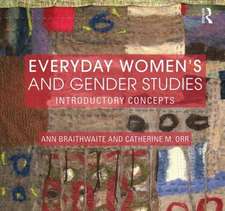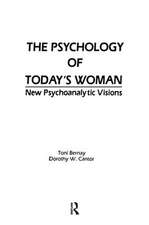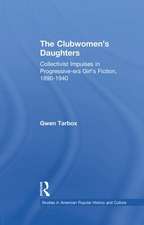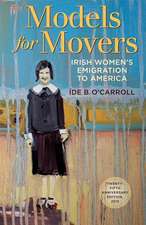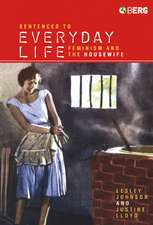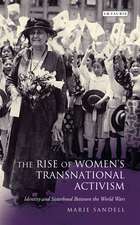Shirley Jackson and Domesticity: Beyond the Haunted House
Editat de Prof Jill E. Anderson, Prof Melanie R. Andersonen Limba Engleză Paperback – 29 dec 2021
| Toate formatele și edițiile | Preț | Express |
|---|---|---|
| Paperback (1) | 198.22 lei 6-8 săpt. | |
| Bloomsbury Publishing – 29 dec 2021 | 198.22 lei 6-8 săpt. | |
| Hardback (1) | 657.05 lei 6-8 săpt. | |
| Bloomsbury Publishing – 24 iun 2020 | 657.05 lei 6-8 săpt. |
Preț: 198.22 lei
Preț vechi: 258.12 lei
-23% Nou
Puncte Express: 297
Preț estimativ în valută:
37.93€ • 39.38$ • 31.63£
37.93€ • 39.38$ • 31.63£
Carte tipărită la comandă
Livrare economică 22 martie-05 aprilie
Preluare comenzi: 021 569.72.76
Specificații
ISBN-13: 9781501370014
ISBN-10: 1501370014
Pagini: 272
Dimensiuni: 152 x 229 mm
Greutate: 0.36 kg
Editura: Bloomsbury Publishing
Colecția Bloomsbury Academic
Locul publicării:New York, United States
ISBN-10: 1501370014
Pagini: 272
Dimensiuni: 152 x 229 mm
Greutate: 0.36 kg
Editura: Bloomsbury Publishing
Colecția Bloomsbury Academic
Locul publicării:New York, United States
Caracteristici
There has recently been a resurgence in Jackson's popularity, with reissues of her novels and a popular Netflix adaptation of The Haunting of Hill House, prompting more scholars to take an interest in her lesser-known fiction
Notă biografică
Jill E. Anderson is Associate Professor in English at Tennessee State University, USA.Melanie R. Anderson is Assistant Professor of English at Delta State University, USA. She is the author of Spectrality in the Novels of Toni Morrison (2013) and co-editor of The Ghostly and the Ghosted in Literature and Film: Spectral Identities (2013) and Shirley Jackson, Influences and Confluences (2016).
Cuprins
Notes on ContributorsAcknowledgmentsIntroductionMelanie R. Anderson (Delta State University, USA)1. Hideous Doughnuts and Haunted Housewives: Gothic Undercurrents in Shirley Jackson's Domestic HumorBernice M. Murphy (Trinity College Dublin, Ireland)2. Enemies Foreign and Domestic: Shirley Jackson's New Yorker StoriesAshley Lawson (West Virginia Wesleyan College, USA)3. "You Didn't Look Like You Belonged in This House": Shirley Jackson's Fragile DomesticitiesMichael Dalpe, Jr. (College of New Jersey, USA)4. "Sharp Points Closing in on Her Throat": The Domestic Gothic in Shirley Jackson's Short FictionL.N. Rosales (University of Nebraska-Lincoln, USA)5. Endless House, Interminable Dream: Shirley Jackson's Domestic Architecture and the Matrophobic GothicLuke Reid (Dawson College, Canada)6. Casting a Literary Spell: The Domestic Witchcraft of Shirley JacksonAlissa Burger (Culver-Stockton College, USA)7. Homemaking for the Apocalypse: Queer Failures and Bunker Mentality in The SundialJill E. Anderson (Tennessee State University, USA)8. Domestic Apocalypse in Shirley Jackson's The SundialChristiane E. Farnan (Siena College, USA)9. "I May Go Mad, but At Least I Look Like a Lady": The Insanity of True Womanhood in Shirley Jackson's The SundialJulie Baker (Independent Scholar, USA)10. Insisting on the Moon: Shirley Jackson and the Queer FutureEmily Banks (Emory University, USA)11. Shirley Jackson's Merricat Story: Conjugal Narcissism in We Have Always Lived in the CastleRichard Pascal (Australian National University, Australia)12. My House Is My Castle: On the Mutually Enabling Persistence of Familial Devotion and Defunct Economies in Shirley Jackson's We Have Always Lived in the CastleAllison Douglass (Graduate Center, CUNY, USA)13. Flipping Hill House: The Netflix Revision of Shirley Jackson's Landmark NovelJessica McCort (Point Park University, USA)Index
Recenzii
Shirley Jackson and Domesticity makes compelling arguments about role of gender and domesticity within the work of one of the 20th century's most indelible writers. A thoroughly entertaining and insightful collection, this book leaves me eager to revisit and more deeply explore Jackson's stories and essays.
In these thoughtful essays, Shirley Jackson's uncanny narratives emerge as canny reflections on mid-century social concerns. Thus, her 'domestic gothic' includes nuclear threat, suburban dislocation, fraught gender dynamics, and other postwar anxieties shadowing the home and the woman who is so often trapped inside.
Shirley Jackson and Domesticity is a welcome and much-needed contribution to the critical conversation on Shirley Jackson's fiction and the cultural and political milieu in which she was writing. This wide-ranging collection is particularly laudable for the close attention it gives to Jackson's frequently overlooked short fiction, her quasi-autobiographical 'family chronicles' (often dismissed as overly optimistic and lacking depth), and The Sundial, a delightfully catty response to Cold War-era apocalyptic fears. By highlighting the continuities as well as the disjunctions with Jackson's wide-ranging oeuvre, the volume undertakes the important work of ensuring that 'The Lottery' and her most famous novels are placed side by side with her more neglected works, and that the latter are given the attention and rigorous analysis that they have long deserved.
In these thoughtful essays, Shirley Jackson's uncanny narratives emerge as canny reflections on mid-century social concerns. Thus, her 'domestic gothic' includes nuclear threat, suburban dislocation, fraught gender dynamics, and other postwar anxieties shadowing the home and the woman who is so often trapped inside.
Shirley Jackson and Domesticity is a welcome and much-needed contribution to the critical conversation on Shirley Jackson's fiction and the cultural and political milieu in which she was writing. This wide-ranging collection is particularly laudable for the close attention it gives to Jackson's frequently overlooked short fiction, her quasi-autobiographical 'family chronicles' (often dismissed as overly optimistic and lacking depth), and The Sundial, a delightfully catty response to Cold War-era apocalyptic fears. By highlighting the continuities as well as the disjunctions with Jackson's wide-ranging oeuvre, the volume undertakes the important work of ensuring that 'The Lottery' and her most famous novels are placed side by side with her more neglected works, and that the latter are given the attention and rigorous analysis that they have long deserved.

